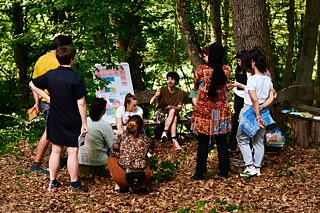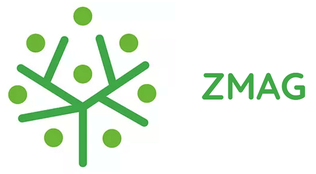Common Waste
Common Libraries
The 4 Teams and their ideas
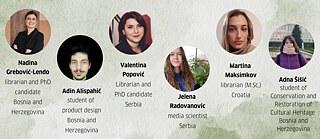
The CO-lib project successfully created a website designed to provide a variety of toolkits for librarians and patrons, significantly improving library operations and services. Each toolkit includes video materials in the form of presentations, thoroughly covering specific topics, alongside workshop guides containing detailed instructions for organizing educational sessions. The project was informed by trends shaping the library experience in 2023, such as digital transformation, smart speaker technologies, sustainability, flexible community spaces, and the emergence of new library standards. In response to these trends, the toolkit topics covered library resource management, digitization, academic database searches, organizing literary events, and information technology education. The project targeted both librarians, aiming to enhance their professional skills and knowledge, and patrons, who sought to better utilize library resources. Through these efforts, CO-lib enabled libraries to improve services by equipping staff with the necessary skills and educating patrons, ultimately fostering greater engagement and satisfaction among all library users.
The comprehensive website hosts a range of toolkits for librarians and patrons. Each toolkit includes video presentations on specific topics, accompanied by detailed workshop guides to facilitate educational sessions. In its initial phase, the project successfully addressed three key topics:
- Open Journal System
- Green Libraries
- Digital Tools
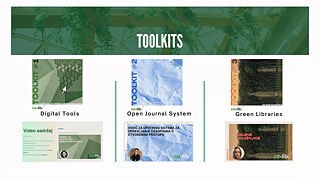
The website serves as a centralized, user-friendly platform for accessing these resources. Continuous updates and curation ensure the toolkit content remains relevant and comprehensive. As a result, librarians enhanced their skills, and patrons benefited from improved library services, which contributed to increased satisfaction among the library community.
In addition to the website, the project established a strong social media presence on Facebook and Instagram. Through these platforms, CO-lib regularly promoted content from the website, sharing articles, blog posts, and other educational materials. Visual content, including graphics and video clips, helped engage users and promote the project’s offerings, further increasing visibility and participation in the toolkit resources.
The materials are available in Bosnian, Serbian, and Croatian languages.
Links to project:
Website CO-lib
YouTube
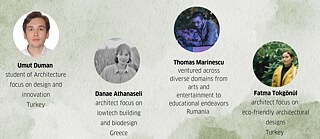
What is Mycelium?
Mycelium is the root-like structure of fungi, consisting of a network of fine, thread-like filaments called hyphae. It forms the vegetative part of fungi, typically found underground or within decaying organic material.
Mycelium plays a crucial role in ecosystems by breaking down organic matter, recycling nutrients, and forming symbiotic relationships with plants.
Beyond its ecological role, mycelium has gained attention for its potential in sustainable technology and materials science. It can be used to create eco-friendly products like:
Biodegradable Packaging: Replacing plastics and Styrofoam.
Construction Materials: Mycelium bricks, insulation, and panels.
Textiles and Fashion: Mycelium leather, a sustainable alternative to animal leather.
Health Products: Nutritional supplements and meat substitutes, with potential for medicinal applications.
Mycelium’s fast growth, versatility, and ability to use agricultural waste as a substrate make it an attractive option for environmentally conscious innovation
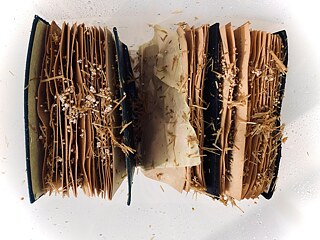
Purpose
The purpose of book•it is to drive open-source research on mycelium, foster sustainable practices, and empower communities. The project aims to lead mycelium research, promoting eco-conscious initiatives in libraries and beyond.
Target Audience
This project is aimed at educators, sustainability advocates, libraries, and community spaces interested in innovative, eco-friendly materials.
Future Plans
While our team will be pursuing individual paths due to distance and scheduling commitments, we remain committed to continuing mycelium research independently. Each of us will explore different aspects of prototyping scalable mycelium-based products, such as furniture and building materials. Although our formal collaboration under book•itwill not continue, we hope to contribute to a shared understanding of mycelium by engaging with sustainability and educational organizations individually. We also aim to stay connected through informal knowledge exchanges to further promote community-led sustainability.
Presentation at Final Event:
Contacts:
Fatma Tokgönül | ftokgonul@gmail.com
Danae Athanaseli | thanaselid@gmail.com
Thomas Marinescu | thomas.marinescu@icloud.com
Umut Duman | umutduman91@gmail.com
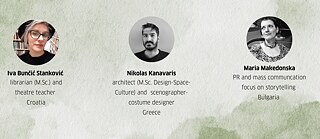
"Change the Script" is a vibrant, creative initiative designed to reignite a love for reading and bring communities closer together through the transformative power of theater. At its core, the project revolves around the imaginative recycling of discarded library books, transforming them into dynamic performances that breathe new life into forgotten stories. We envision libraries as cultural hubs where people rediscover their passion for books and theater becomes a powerful link to forgotten emotions, characters, and worlds. By turning discarded books into scenographic elements such as sets, costumes, and props, the project embraces both storytelling and sustainability.
The Collaborative Process
The success of "Change the Script" lies in collaboration between a Library and local artists- a dramaturg and a scenographer and two actors-. It all begins with raising awareness and encouraging people to donate unused books in the Library. This is followed by two key workshops: the first is a dramaturgy workshop where participants collectively craft a new storyline, and the second is a scenography workshop, where the donated paper is transformed into the imaginary world of the performance by crafting sets, costumes, props, and masks. With these elements in place, the actors and creative team bring the story to life in a performance staged in the Library.
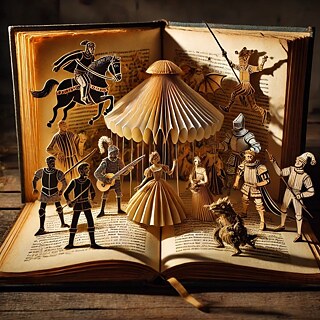
The project aims to foster new collaborations between libraries and cultural institutions, while developing skills in creative recycling and community engagement. By connecting theatrical creation with library spaces, "Change the Script" establishes theater as a sustainable artistic practice that promotes material recycling. The goal is to provide librarians with a toolkit for creating their own sustainable theatrical projects, enriching library spaces with innovative, community-driven performances.
Pilot Project and Future Expansion
A pilot implementation of "Change the Script" is currently underway at the Vladimir Nazor Library in Zagreb, where the process is being documented to create visuals for the project's toolkit. The crafted materials from the performance will be exhibited in the library, offering a tangible connection to the creative journey. We also plan to link the project with the Paper Art Festival in Bulgaria, bringing the artistic and sustainable elements to a broader audience. Looking ahead, the project will expand to Sofia in collaboration with Goethe Bulgarien and to Athens with Goethe Athens. Stay tuned to our Facebook page for updates as we continue to transform discarded books into new worlds, one performance at a time!
Social Media: Facebook
Contact:
Iva Bunčić Stanković (Croatia), iva.buncic@gmail.com
Nikolaos-Ioannis Kanavaris (Greece), nick.kana@gmail.com
Maria Slaveva Makedonska (Bulgaria), makedonska.m.s@gmail.com
Our project, "The Sustainable Neighbors," is an initiative led by four passionate young women with a shared vision to make libraries more sustainable. Our project targets three key groups: librarians, the general public, and children (students). To better understand current awareness levels, we conducted a survey among librarians to assess their knowledge of sustainability and to inform the broader community. Based on the results of this survey, we developed a comprehensive guide outlining strategies for making libraries more sustainable. In addition, we organize events designed to educate library patrons about sustainability through workshops, open discussions, and educational programs. These activities aim to foster a deeper understanding of environmental issues and the importance of sustainable practices.
What sets our project apart is its innovative approach, rooted in research on the current operations of libraries. Our action plan is directly informed by this research and tailored for practical implementation.
The project is adaptable and can be implemented in various types of libraries, with minor adjustments depending on the specific context. For example, in an art library, educational programs might be designed around paintings of green landscapes. These artworks could then serve as a bridge to discussions on the environmental degradation caused by human activity, raising awareness of the need for environmental preservation.

To support our mission, we created a website, where we publicly share all our information, resources, and documentation related to the project. Additionally, we established a social media presence under the name “sustainable_neighbors” to reach a wider audience and encourage community participation in sustainability initiatives. Through these efforts, we aim to create a network of informed individuals who can advocate for and implement sustainable practices in their communities.
Feel free to contact us anytime for further questions or possible collaborations!
Links:
website
Instagram: sustainable_neighbors
Open Call
The Open Call is aimed at students, young professionals and activists coming from the fields of arts, ecology, sustainability and circular economy. We are also looking for librarians who are interested in libraries as sustainable institutions.
Our ambition is bringing together a group of creative minds to work together on formats relating to the topics mentioned above. The intention is to strengthen libraries as places of informal learning and exchange.
From June to October 2024, Common Waste – Common Libraries will take place with a programme of live and online formats:
- A group of around 15 people will be selected to take part in the project, starting with a three-day Ideathon in Zagreb (5 - 7th June).
- During the Ideathon, transnational teams will be formed and you will receive input and inspiration from mentors and experts.
- In the following months the participants will develop in their teams educational formats for use and implementation in libraries (such as workshops, simulation games, board games, waste detox kit) until September.
Application Deadline was 21 April 2024.
If you have any questions, please contact us at: bib-zagreb@goethe.de
Learn more
The Open Call is aimed at students, young professionals and activists coming from the fields of arts, ecology, sustainability and circular economy. We are were looking for librarians who are interested in libraries as sustainable institutions.
Our ambition is bringing together a group of creative minds to work together on formats relating to the topics mentioned above. The intention is to strengthen libraries as places of informal learning and exchange.
From June to November 2024, Common Waste – Common Libraries is taking place with a programme of live and online formats.
A group of 17 people was selected to take part in the project, starting with a three-day Ideathon in Zagreb (5 - 7th June). During the Ideathon, transnational teams were formed and the participants received input and inspiration from mentors and experts.
In the following months the participants will develop in their teams educational formats for use and implementation in libraries (such as workshops, simulation games, board games, waste detox kit) until September.
The project language is English. The participants are from the following countries: Greece, Bosnia and Herzegovina, Bulgaria, Croatia, Romania, Serbia and Turkey.
Application Deadline was 21 April 2024.
If you have any questions, please contact us at:bib-zagreb@goethe.de
- May (Date tba.) Introductory Online Session with all participants
- Ideathon 5 – 7 June Crossnational teambuildung, Input/Workshops
- June – September Development and Production phase with 3 Online-Workshops
- End of September Final Festival (Online or Offline) – Presentation of the products
- Untill November Implementation in libraries

"Change the Script" is a vibrant, creative initiative designed to reignite a love for reading and bring communities closer together through the transformative power of theater. At its core, the project revolves around the imaginative recycling of discarded library books, transforming them into dynamic performances that breathe new life into forgotten stories. We envision libraries as cultural hubs where people rediscover their passion for books and theater becomes a powerful link to forgotten emotions, characters, and worlds. By turning discarded books into scenographic elements such as sets, costumes, and props, the project embraces both storytelling and sustainability.
The Collaborative Process
The success of "Change the Script" lies in collaboration between a Library and local artists- a dramaturg and a scenographer and two actors-. It all begins with raising awareness and encouraging people to donate unused books in the Library. This is followed by two key workshops: the first is a dramaturgy workshop where participants collectively craft a new storyline, and the second is a scenography workshop, where the donated paper is transformed into the imaginary world of the performance by crafting sets, costumes, props, and masks. With these elements in place, the actors and creative team bring the story to life in a performance staged in the Library.

The project aims to foster new collaborations between libraries and cultural institutions, while developing skills in creative recycling and community engagement. By connecting theatrical creation with library spaces, "Change the Script" establishes theater as a sustainable artistic practice that promotes material recycling. The goal is to provide librarians with a toolkit for creating their own sustainable theatrical projects, enriching library spaces with innovative, community-driven performances.
Pilot Project and Future Expansion
A pilot implementation of "Change the Script" is currently underway at the Vladimir Nazor Library in Zagreb, where the process is being documented to create visuals for the project's toolkit. The crafted materials from the performance will be exhibited in the library, offering a tangible connection to the creative journey. We also plan to link the project with the Paper Art Festival in Bulgaria, bringing the artistic and sustainable elements to a broader audience. Looking ahead, the project will expand to Sofia in collaboration with Goethe Bulgarien and to Athens with Goethe Athens. Stay tuned to our Facebook page for updates as we continue to transform discarded books into new worlds, one performance at a time!
Social Media: Facebook
Contact:
Iva Bunčić Stanković (Croatia), iva.buncic@gmail.com
Nikolaos-Ioannis Kanavaris (Greece), nick.kana@gmail.com
Maria Slaveva Makedonska (Bulgaria), makedonska.m.s@gmail.com
Partners
Common Waste is being realised by the Goethe-Institut in Athens, Belgrade, Bucharest, Istanbul, Sarajevo, Sofia, Thessaloniki and Zagreb in cooperation with our partner Green Network of Activist Groups (ZMAG).
